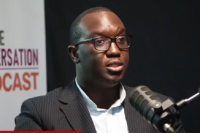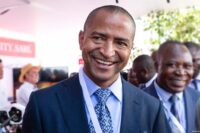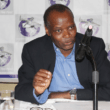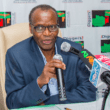WILLIAM Nelson Cromwell Professor of International and Comparative Law Muna Ndulo says it seems that in Zambia today, the police have taken over the constitutional responsibilities of the Director of Public Prosecutions, a situation which has led to many people being unfairly charged with serious non bailable offences.
In an article titled “The moral arc of justice: Zambia persecutions or prosecutions, the DPP’s role”, Monday, Prof Ndulo said police were not qualified to draft charges.
“The criminal prosecution system in Zambia has given most Zambians cause for concern. Currently, one of the most alarming practices is the police charging people with serious unbailable crimes and keeping them behind bars on the pretext that they are waiting for instructions from the DPP office on how to proceed in the case. The DPP then inordinately delays giving the instructions which results in the accused remaining behind bars for a protracted period of time. This scenario suggests that in Zambia, the police have captured the prosecution service, and have taken over the constitutional responsibilities of the DPP and determine who is prosecuted, when, and for what. The police arrest and draft charges and then refer the matter to the DPP. In practice, it should be the other way round. The Police should arrest people and prepare the docket and hand it over to the DPP to determine whether a criminal charge is sustainable on the evidence provided and the drafting of charges. Drafting charges requires legal training which the police do not have. Investigation (a police function) and prosecution (prosecution function) are two distinct functions,” Prof Ndulo stated.
He listed some cases which, he argued, had badly drafted charges.
“A number of recent cases demonstrate the appalling levels of drafting criminal charges in Zambia. In the Mushipe sedition case, the drafters of the charges were ignorant of the legal definition of sedition and the magistrate expressed surprise that a charge was brought on the facts presented to the court which did not disclose sedition by any stretch of imagination. In 2018, Hakainde Hichilema was charged with treason and the charge sheet did not disclose an overt act—a necessary element in any treason charge. In 2016 Mwaliteta and others were charged with robbery for questioning election results. They were acquitted after spending a year in detention. In the Laura Miti and Pilato case in Livingstone where the two were charged with assaulting police officers and disorderly conduct, the police officers who testified could not agree on what happened at the church where the offence is alleged to have occurred. This is very basic legal knowledge which any well trained lawyer should know. Part of the Criminal Procedure course in the law degree teaches one how to draft criminal charges and criminal law course teaches lawyers the elements of the crimes. Clearly, in Zambia as the cases above demonstrate, the charge is more important than its outcome,” he wrote.
Prof Ndulo stated that weaponizing the justice system undermined democracy.
“Fair and effective prosecution is essential to a properly functioning criminal justice system and to the maintenance of law and order in a democratic state. The individuals involved in a crime – the victim, the accused, and the witnesses – as well as society as a whole have an interest in the decision whether to prosecute and for what offence, and in the outcome of the prosecution. The decision to prosecute or not to prosecute is of great importance and have far-reaching consequences for an individual. Even where an accused person is acquitted, the consequences resulting from a prosecution can include loss of reputation, disruption of personal relations, loss of employment and financial expense, in addition to the anxiety and trauma caused by being charged with a criminal offense,” Prof Ndulo stated.
“A wrong decision to prosecute or, conversely, a wrong decision not to prosecute, both tend to undermine the confidence of the community in the criminal justice system. For victims and their families, a decision not to prosecute can be distressing. The victim, having made what is often a very difficult and occasionally traumatic decision to report a crime, may feel rejected and doubted. The worst consequences are in situations where the criminal justice system is weaponized to fight political opponents. Weaponizing the justice system undermines democracy.”
Prof Ndulo said it was sad that people were being taken to court on defective charges because the DPP had let police take the upper hand.
“As a prosecutor in the Legal Affairs office in the 1970s, we reserved Thursdays as a day to visit the Lusaka Central Police to vet dockets. We went through dockets with the police and advised them to close dockets when the facts did not reveal a crime and asked them to gather further evidence where this was necessary in order to sustain a charge. Nowadays people are brought to court on defective charges and the Police have taken the upper hand while the Director of Public Prosecutions now seems to follow the police with cap in tow. The practice represents the degradation of the prosecution services, this has fundamentally compromised governance and placed at risk the reliability and predictability that is demanded of the criminal justice system by the rule of law. Apart from this sad development, this exemplifies the corrosive effect on our institutions and on the fundamental concept of the right of the accused person to a speedy trial,” Prof Ndulo stated.
“There are only two possible explanations for the situation, either the DPP office is compromised and is playing political games or the office lacks the necessary integrity or competence to undertake competent prosecutions.”
He said prosecutors were always supposed to act with fairness and on behalf of the community.
“If someone is in charge of prosecutions, they would have to give directions or furnish guidelines to the police, including investigative officers and prosecutors setting out standards of professional responsibilities and essential duties of prosecutors. In prosecution matters, the DPP must act on behalf of the community. Prosecutors must always act with fairness and detachment with the objectives of establishing the truth and ensuring a fair trial. A prosecutor’s overarching duty is not to win a case, but that justice shall be done. The foundation of a criminal justice system in a democratic state is ‘due process of law’ which requires law enforcement officers and prosecutors to safeguard ‘fundamental fairness’ in the administration of justice. That is the presumption of innocence and a fair process by which an individual is investigated, and charged. If an investigation or prosecution does not or cannot provide due process for its subjects, the DPP is duty bound to stop the prosecution,” stated Prof Ndulo.
“Among the myriad ways the government can violate due process are through ‘vindictive’ uses of its law enforcement powers and through public comments on the purported guilt of a subject that impairs the presumption of innocence and a fair trial. Prosecutors wield enormous power. They make the first critical decision on whether to deploy the ultimate power of the state – the power to punish – against particular targets. The degree to which, and the ways in which, prosecutorial power is checked largely defines a society’s conformance to the rule of law. The power can be exercised to pursue the innocent, to impose punishment without trial or conviction, and to pressure targets to compromise or capitulate rather than bear risks and costs of asserting their rights or innocence. Where the system is unchecked, it allows unprincipled prosecutors to impose drastic punishments on selected targets without the constraints traditionally associated with the rule of law.”
Prof Ndulo said there was need to recapture the police and the prosecution service.
“In closing, I would like to say that it is important that we set to recapture the police and the prosecution service so that we ensure that prosecutors carry out their functions in accordance with the constitution which provides that the Director of Public Prosecutions shall be independent in the performance of her functions. The DPP and her prosecutors should exercise their functions free of any extraneous influences, inducements, pressures, threats or interference, direct or indirect, from any quarter or for any reason. They should at all times uphold the rule of law, integrity of the criminal justice system and the right to a fair trial,” stated Prof Ndulo.
“For us as a country to reign in the prosecution authority, prosecutors and the police, the judiciary needs to play its part in ending the blatant abuse of the criminal justice system. The judiciary is critical to safeguarding the rights of people and should not act like a department of the executive. There are many good judges in Zambia but sadly, there are also many who act as if they were a branch of the executive. These are the ones doing irreparable harm to the judiciary. The judiciary have the power to dismiss cases that are clearly an abuse of the prosecutorial service.”












